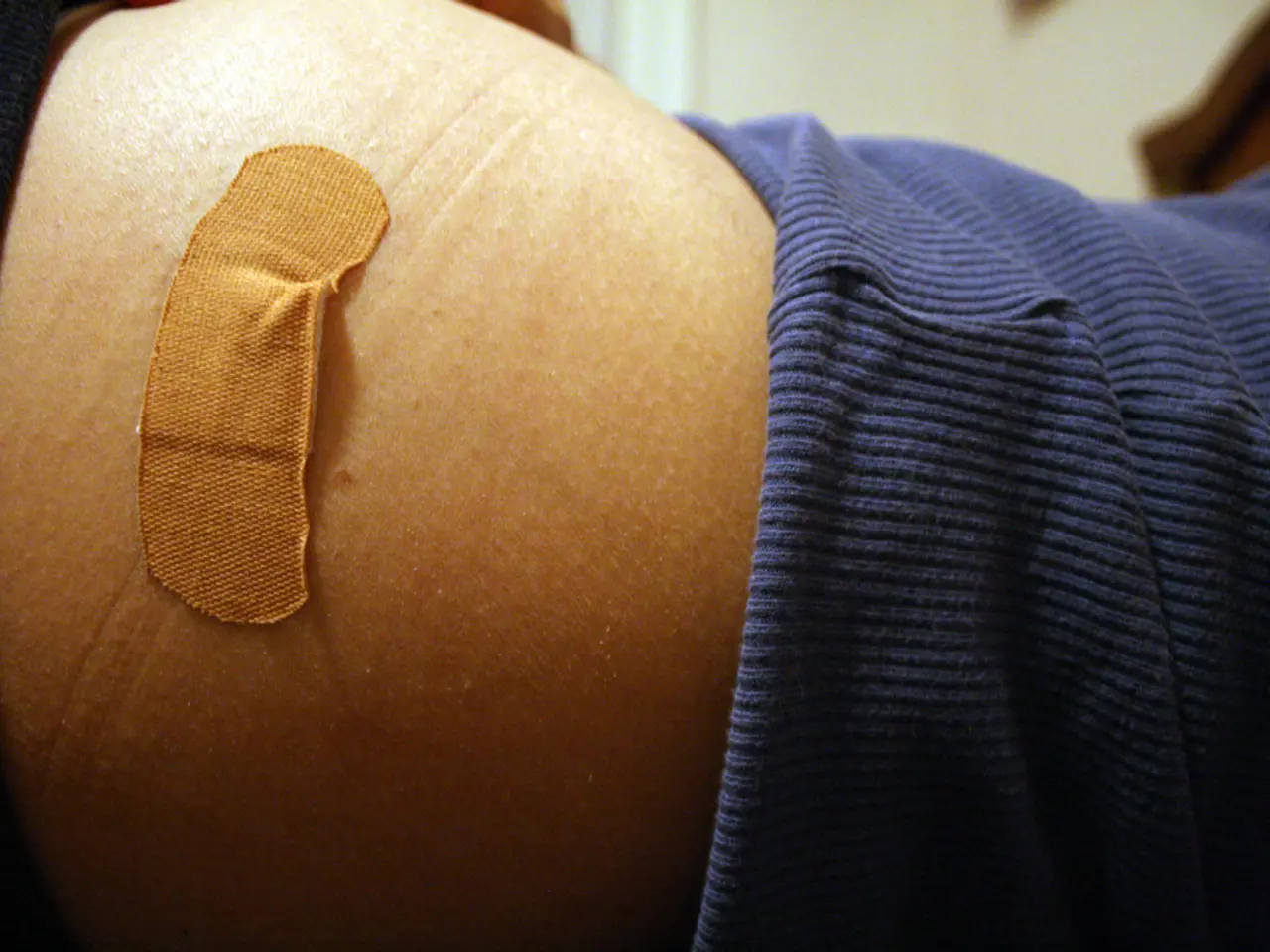Uncovering the Key Concept of Proactive Health Monitoring: Early Disease Detection
In today's rapidly evolving healthcare landscape, early disease detection has become a cornerstone of proactive health management. By identifying diseases at their initial stages before symptoms manifest, we can significantly improve outcomes for conditions such as cancer, diabetes, and heart disease.
At-home genetic testing kits are playing a pivotal role in this revolution, enabling individuals to analyze their genetic predispositions to certain diseases. The integration of patient data from various sources will become crucial, enabling healthcare providers to tailor screening and prevention strategies to individual patients, enhancing the effectiveness of early disease detection systems.
One of the latest advancements in technology for early disease detection is multi-cancer early detection (MCED) using liquid biopsies combined with artificial intelligence (AI). This innovative technology detects multiple cancers from a single blood sample by analyzing circulating tumor cells, DNA, and immune/metabolic markers. Integrating AI and metagenomics allows early, personalized risk identification, shifting cancer care from reactive screening to proactive prevention and interception.
Another significant development is the emergence of AI-powered diagnostic systems with near-perfect accuracy. New AI diagnostics trained on millions of medical images and data can detect diseases like cancer, cardiovascular diseases, and neurodegenerative disorders well before symptoms appear. For instance, cancer detection can occur up to 18 months earlier than traditional methods, improving treatment success chances substantially.
Edith Cowan University has developed the Supervised Contrastive Ordinal Learning AI Algorithm. This AI analyzes routine, non-invasive medical images such as bone density scans and ultrasounds to detect and stage diseases like cardiovascular disease, diabetic retinopathy, and cancer early on. This aids faster, more objective diagnosis compared to manual assessments.
Machine Learning models now incorporate lifestyle, genetics, and medical history to forecast disease risk, progression, and severity in neurological, cardiovascular, infectious, and mental health conditions. This enables tailored preventive care and monitoring before symptoms arise.
Arizona State University researchers have developed the Rapid Nanoparticle Blood Test (NasRED), a portable, low-cost test using a single blood drop and gold nanotechnology to detect deadly infectious diseases (e.g., COVID-19, Ebola, HIV, Lyme) within 15 minutes. It matches or exceeds lab-based accuracy without specialized equipment or training, ideal for broad clinical use.
These technologies collectively represent a major leap toward earlier, more accurate, and less invasive disease detection, enabling personalized medicine and potentially saving countless lives.
Wearable health devices, such as smartwatches and fitness trackers, can track vital signs, activity levels, and sleep patterns, potentially preventing serious conditions like heart disease. Mobile health applications can remind users to schedule regular check-ups, track symptoms, and provide educational resources about disease prevention, encouraging proactive health management.
Early disease detection empowers individuals to take charge of their health by providing them with knowledge about their health status. Artificial Intelligence and machine learning can predict the likelihood of developing certain conditions based on genetic, lifestyle, and environmental factors.
Common diseases that can be detected early include cancer, cardiovascular diseases, diabetes, chronic respiratory diseases, and Alzheimer's disease. Machine learning can improve the accuracy of diagnostic imaging, helping radiologists detect abnormalities earlier. AI and machine learning can analyze medical imaging, such as X-rays and MRIs, to detect abnormalities that may be missed by the human eye, leading to earlier intervention.
As we continue to advance in this field, the potential for early disease detection to transform healthcare and save lives is immense. Embracing these technologies and integrating them into our healthcare systems will be crucial in the fight against disease.
- In the realm of science, advancements in personalized health insights are revolutionizing the healthcare industry.
- The advent of workplace-wellness programs emphasizes the importance of early detection and management of medical-conditions.
- Healthcare providers are increasingly focusing on chronic-diseases like cancer, respiratory-conditions, and digestive-health issues.
- The integration of AI in cancer screening aims to combat cance by detecting it at earlier stages, enhancing treatment success rates.
- Early detection of cardiovascular-health issues can significantly improve patient outcomes, making heart disease less fatal.
- Eye-health, hearing, and skin-care are critical components of overall health and wellness, necessitating tailored early-detection strategies.
- Fitness-and-exercise play a pivotal role in disease prevention, as a healthy lifestyle can reduce the risk of multiple medical-conditions.
- Autoimmune-disorders, neurological-disorders, and skin-conditions require swift intervention, making early detection paramount.
- Climate-change poses various health risks, fostering the need for early detection systems to address environmental-science-related medical-conditions.
- The manufacturing sector needs to prioritize worker safety by investing in early detection technology for potential job-related illnesses.
- Mental-health conditions often require swift intervention, with early detection being crucial for therapies-and-treatments to be effective.
- Artificial Intelligence is revolutionizing the skincare industry, enabling AI-powered tools to identify and address skin-conditions early on.
- Nutrition plays a vital role in disease prevention and management, making it a key factor in personalized health insights.
- Early detection and intervention in respiratory-conditions can save lives, making respiratory-health a significant focus in the industry.
- The tech-driven health sector influences the finances of healthcare businesses, as wellness initiatives support better revenue streams and business growth.
- Medicare beneficiaries would greatly benefit from early disease-detection technology, as it often leads to cost savings in the long run.
- CBD is gaining traction in the health industry, with some studies suggesting it may aid early-detection efforts in certain medical-conditions.
- As early disease detection becomes more accessible, employees may seek innovative solutions to manage their mental-health and well-being in the workplace.
- Fitness-and-exercise apps are capitalizing on wellness trends, providing users with personalized health insights on their workout performance and potential health risks.
- The integration of AI in the retail sector can result in improved health and wellness products, tailored to individual consumer needs based on their health data.
- Entrepreneurship in the health-tech industry showcases a growing interest in revolutionary treatments, devices, and solutions for early disease detection.
- Transportation infrastructure plays a role in disease prevention through the promotion of active commuting, encouraging a healthy lifestyle and early disease detection.
- Leadership in the health sector must prioritize diversity-and-inclusion while integrating new technologies for early disease detection.
- Cybersecurity is becoming a key concern as more health information becomes digitized, necessitating the protection of sensitive patient data in early disease detection systems.
- Lifestyle changes, such as maintaining a healthy diet, getting enough exercise, and managing stress, can help in early detection and prevention of various medical-conditions.
- Small-business owners can adapt to the evolving health landscape by focusing on offering personalized products and services that cater to their customers' health and wellness needs.
- Investing in businesses that leverage AI and machine learning for early disease detection can prove lucrative in the rapidly expanding health-tech industry.
- Home-garden enthusiasts can contribute to their well-being by growing fresh produce rich in essential nutrients for maintaining cardiovascular-health and overall health.








